Skip to main contentSkip to footer![A male employee of the DKMS Life Science Lab, wearing a lab coat and purple gloves, uses a multichannel pipette to transfer samples into a well plate. Laboratory equipment and a computer are visible in the background. A male employee of the DKMS Life Science Lab, wearing a lab coat and purple gloves, uses a multichannel pipette to transfer samples into a well plate. Laboratory equipment and a computer are visible in the background.]()
![Prof. Dr. Johannes Schetelig wearing a white coat smiles gently at the camera and sitting at a desk in an office. He is holding glasses in his right hand, with papers, a keyboard, and a telephone visible on the desk behind him. Prof. Dr. Johannes Schetelig wearing a white coat smiles gently at the camera and sitting at a desk in an office. He is holding glasses in his right hand, with papers, a keyboard, and a telephone visible on the desk behind him.]()
![An female employee of the DKMS Life Science Lab with dark brown hair tied back in a ponytail, wearing a white lab coat and purple gloves, works with laboratory equipment. An female employee of the DKMS Life Science Lab with dark brown hair tied back in a ponytail, wearing a white lab coat and purple gloves, works with laboratory equipment.]()
![Prof. Katharina Fleichhauer, wearing glasses, a dark patterned jacket, and a necklace, holds a microphone in her hands while speaking on stage at the Mechtild Harf Science Award 2024. The background is softly lit with red lighting. Prof. Katharina Fleichhauer, wearing glasses, a dark patterned jacket, and a necklace, holds a microphone in her hands while speaking on stage at the Mechtild Harf Science Award 2024. The background is softly lit with red lighting.]()
![The winner of the Mechtild Harf Science Award Prof. Robert Zeiser, wearing a dark suit, holds the award trophy, in the shape of an x, and stands in front of a red DKMS banner that reads "Mechtild Harf Science Award 2024". The winner of the Mechtild Harf Science Award Prof. Robert Zeiser, wearing a dark suit, holds the award trophy, in the shape of an x, and stands in front of a red DKMS banner that reads "Mechtild Harf Science Award 2024".]()
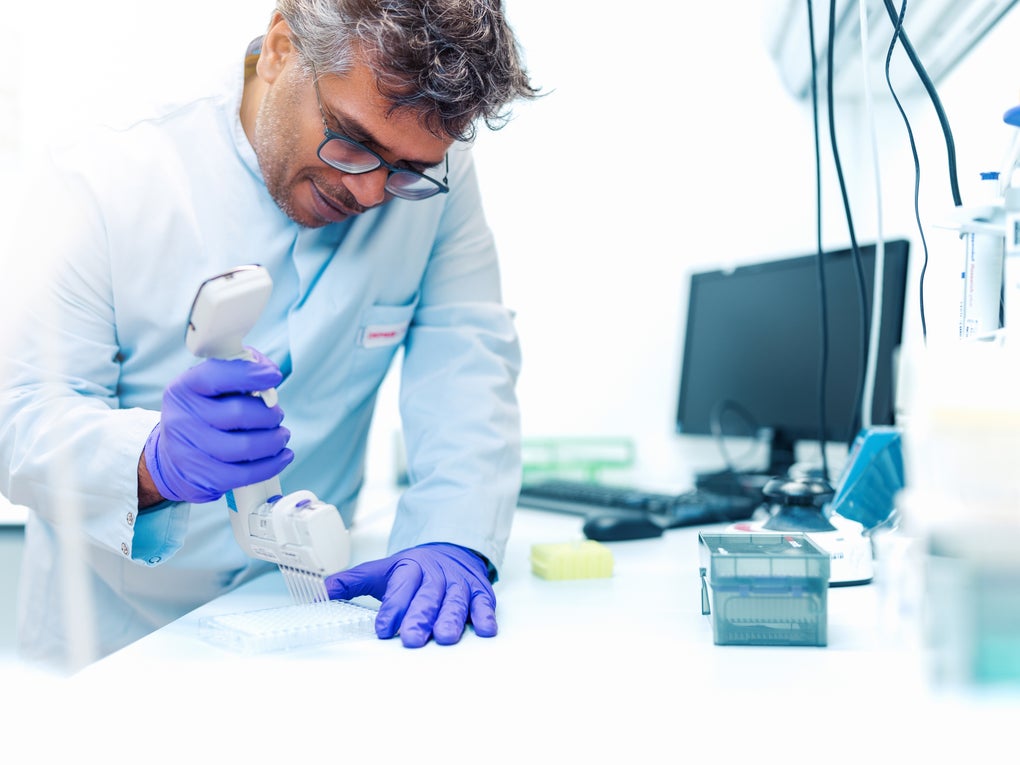
Pillar 3 - Advance Research & Development
Pillar 3
Advance Research & Development drives innovation in blood cancer treatment through pioneering research, clinical trials, and novel cell therapies. We want to improve patient outcomes and shape the future of blood cancer treatment by enhancing advanced diagnostics and supporting scientific progress.
Celebrating our 1,000th clinical trial participant
Our Clinical Trials Unit has reached 1,000 enrolled patients, driving innovation to improve survival.
Since 2013, our Clinical Trials Unit (CTU) in Dresden, Germany has been driving research to improve transplantation outcomes. Our team of more than 30 experts conducts its own clinical studies and invests in international research collaborations to advance and improve stem cell transplantation. This year, our research reached a significant milestone: we passed the 1,000 mark for patients enrolled, a powerful step toward advancing lifesaving therapies.
The CTU also works closely with the DKMS Life Science Lab and operates the Collaborative Biobank (CoBi). With the donor and patient’s consent, the CoBi processes and stores their stem cell samples to support cutting-edge research worldwide. Our studies focus on improving donor selection, refining transplantation protocols, and developing better post-transplant care strategies.
“Reaching this milestone of 1,000 patients enrolled would never have been possible without the strong and trusting collaboration we have with our network of dedicated transplant centers. Their support gives us the foundation to conduct meaningful research and bring innovative studies to life.”
Prof. Dr. Johannes Schetelig,
Director Clinical Research at DKMS and Head of Stem Cell Transplantation at the University Hospital Dresden
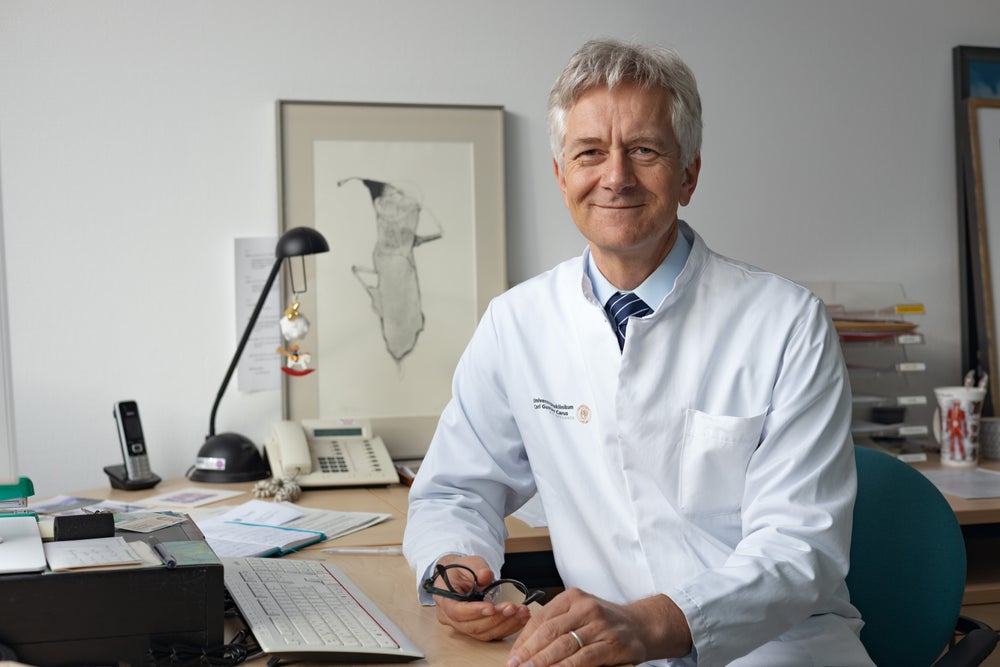
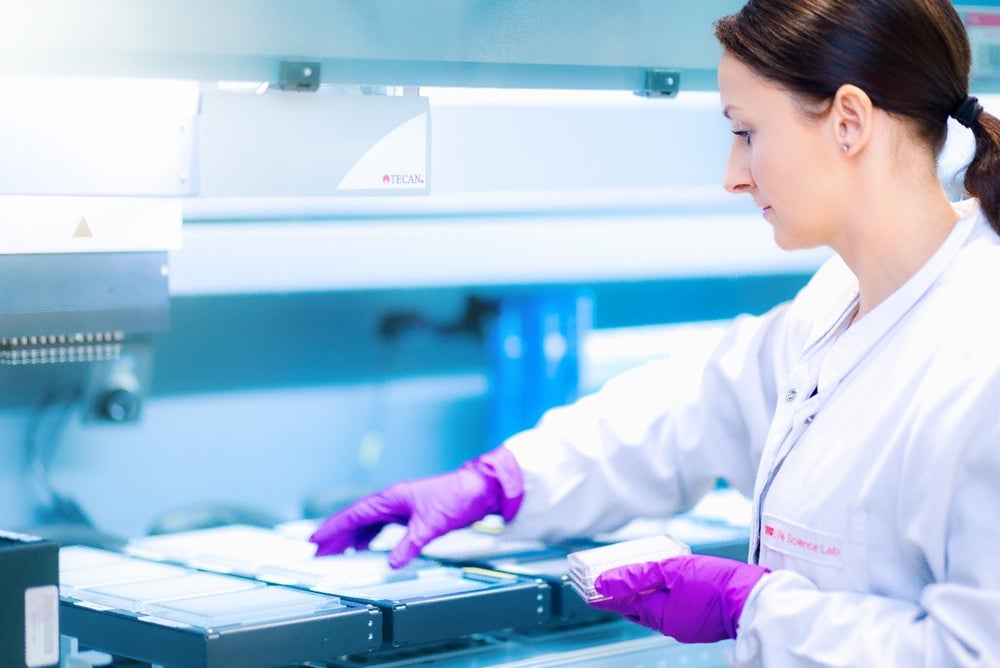
Three questions for Katharina Fleischhauer
From breakthrough findings to mentoring future scientists: How Katharina Fleischhauer continues to shape the field.
Professor Katharina Fleischhauer is a renowned expert in the world of stem cell transplantation. She started her career at the prestigious Memorial Sloan Kettering Cancer Center in New York, later leading the Unit for Immunogenetic Diagnostics and Research at the San Raffaele Scientific Institute in Milan, Italy. She then became Head of the Institute for Experimental Cellular Therapy in Essen, Germany. Katharina Fleischhauer won the DKMS Mechtild Harf Science Award in 2016 and is now a longstanding member of the DKMS Medical Council. We spoke to her about her lifesaving work and our joint mission:
What inspired you to enter the research field of allogeneic stem cell transplantation?
During medical school, I learned how empirical clinical treatment can be at times, as we often have insufficient knowledge about the complex mechanisms governing health and disease. This sparked my interest in contributing to patient-oriented scientific research. After getting my MD, I was fortunate enough to receive the opportunity to join the Immunogenetics Department of the Memorial Sloan Kettering Cancer Center in New York, where allogeneic stem cell transplantation was pioneered in the late 1980s. My first project investigated why a fatal transplant rejection occurred despite serological HLA identity between donor and recipient. The results showed, for the first time, that a single amino acid difference between patient and donor HLA determined the clinical outcome. They were published in the New England Journal of Medicine.
This experience ignited my enthusiasm for what, even after almost 40 years, I still consider one of the most rewarding fields in medicine, with a profound impact on treating life-threatening diseases such as leukemia. I was fortunate to have mentors who supported and inspired me throughout my career, in particular Soo Young Yang, Bo Dupont, and Richard O’Reilly at Sloan, and later Claudio Bordignon and Fabio Ciceri at San Raffaele in Milan.
In a few words, what is your research about and how will it impact patient outcomes?
Allogeneic stem cell transplantation is the clinically most consolidated and successful form of immunotherapy for blood cancer and the foundation for new targeted cellular therapies. Leveraging my decade-long experience of donor-recipient compatibility (histocompatibility) and immunogenetics, my research focuses on understanding the complex immunological mechanisms that drive success or failure of treatment. We have developed in vitro models of allogeneic stem cell transplantation to study why some human leukocyte antigen (HLA) mismatches between donor and patient are better tolerated than others. This also allows us to search for cell surface structures that can target leukemia cells without harming healthy ones. Luckily, we can test our hypotheses in collaborations with international registries such as CIBMTR, EBMT, and DKMS. Ultimately, our work supports patients with blood cancer by providing new algorithms for stem cell donor selection, unraveling mechanisms of how tumor cells evade the immune system, and designing new targeted therapies.
You are a longstanding member of the Medical Council. What is your role there and how does your expertise contribute to its work?
It was an honor to join the DKMS Medical Council in 2019, alongside internationally recognized experts. We receive updates on DKMS activities, review results from the DKMS Clinical Trials Unit and the DKMS Life Science Lab, and discuss priorities.
A key part of our role is evaluating DKMS John Hansen Research Grant applications for young scientists and selecting the DKMS Mechtild Harf Science Award recipient. My expertise is especially relevant to research and diagnostics in histocompatibility and immunogenetics, and I also value the exchange with my esteemed colleagues as an opportunity to broaden my own knowledge.
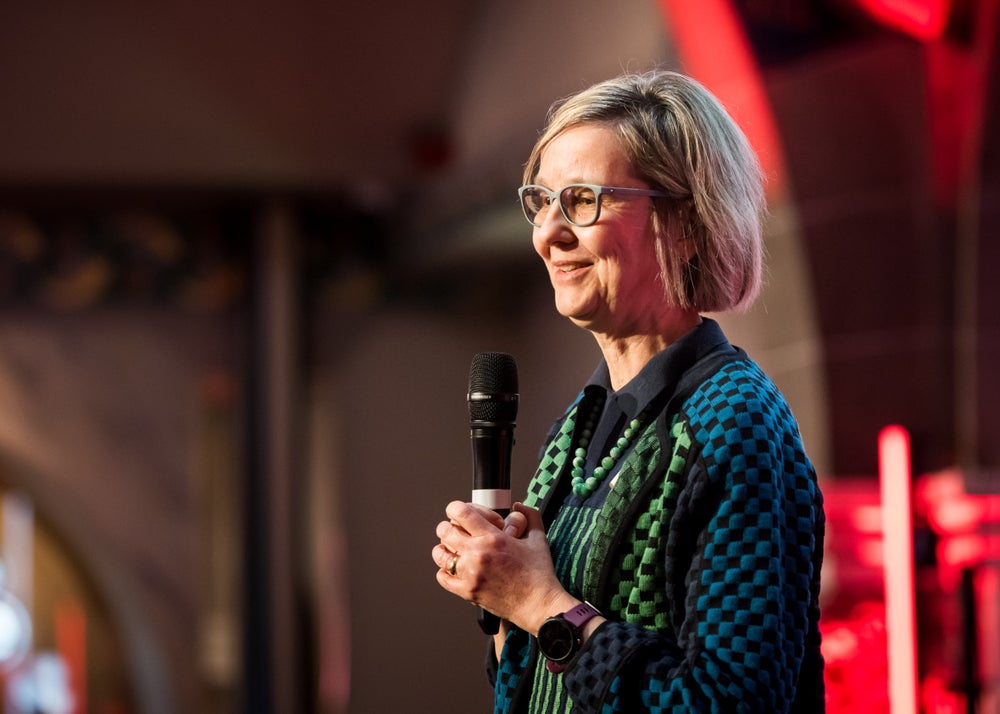
Celebrating breakthroughs in medical research
How the DKMS Mechtild Harf Science Award honors groundbreaking research and the people behind it - like Professor Robert Zeiser, who is working to improve outcomes for transplant patients.
The DKMS Mechtild Harf Science Award, presented by the DKMS Stiftung Leben Spenden, recognizes outstanding contributions in stem cell transplantation and cell therapy. Established in memory of Mechtild Harf, it honors internationally renowned scientists whose work has significantly advanced the treatment of blood cancers and related diseases.
Professor Robert Zeiser, the awardee in 2024, is dedicated to improving outcomes for patients undergoing allogeneic stem cell transplantation by reducing the risk of leukemia relapse and graft-versus-host disease.
Three questions for Professor Robert Zeiser
Winner of the Mechtild Harf Science Award, Robert Zeiser discusses his mission to improve transplant outcomes.
Just briefly, what’s your main research focus?
My research focuses on two common complications occurring after allogeneic stem cell transplantation: leukemia relapse and graft-versus-host disease. Graft-versus-host disease is a condition where the donor’s immune cells mistakenly attack the recipient’s tissue.
How might your research impact the well-being of patients?
The leading cause of death after an allogeneic stem cell transplantation in patients with acute leukemia is relapse of the underlying malignancy. So, our work aims to enhance the immune effects of the donor graft against leukemia cells, ultimately reducing the risk of relapse. Another key goal is to minimize graft-versus-host disease, which in its acute form primarily affects the intestinal tract, liver, and skin. Graft-versus-host is associated with high mortality, so we want to better understand its biology and develop novel strategies for its prevention and treatment.
What does receiving the Mechtild Harf Science Award mean to you?
The Mechtild Harf Science Award means a great deal to me. I have seen the esteemed group of investigators who have received this award in the past, and I feel deeply honored and grateful to be among them. It is a privilege to have my work in allogeneic stem cell transplantation recognized in this way.
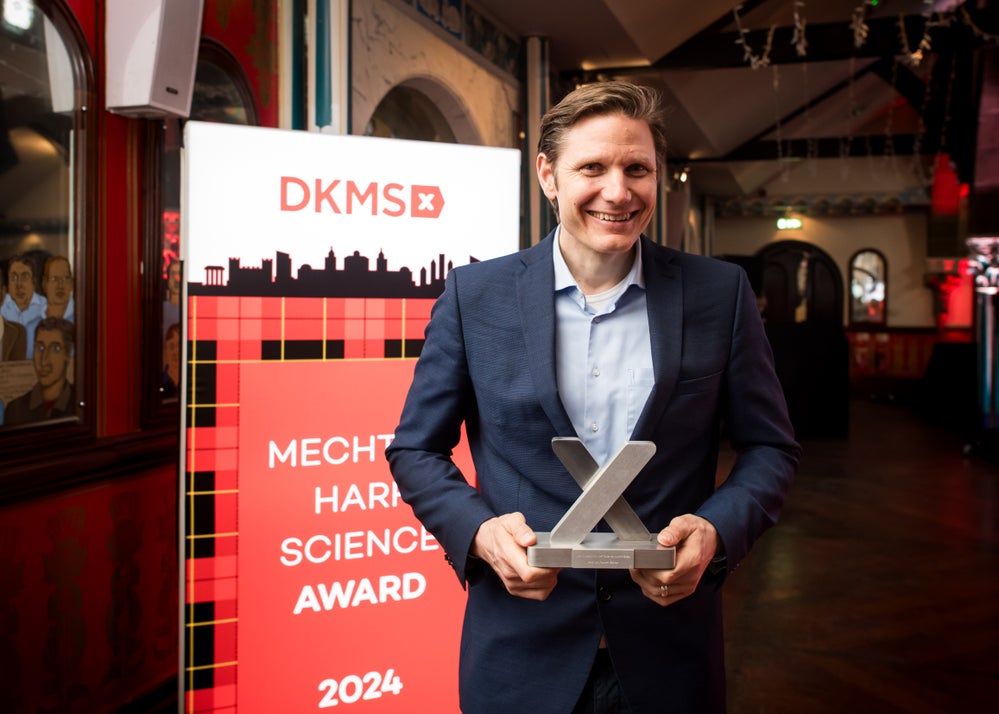
Empowering the next generation of researchers
How the John Hansen Research Grant supports promising scientists shaping the future of blood cancer treatment.
The DKMS John Hansen Research Grant 2024 was awarded to a new group of exceptional young scientists dedicated to advancing medical care and improving outcomes for blood cancer patients worldwide. Each researcher will receive a total of 240,000 euros over a three-year period to support their groundbreaking projects in the fields of cell therapy and stem cell transplantation.
Originally established in 2015 as the Mechtild Harf Research Grant, the program was renamed in 2019 to honor John A. Hansen, a distinguished oncologist and immunogeneticist whose pioneering work on graft-versus-host disease has had a profound impact on the field. Dr. Hansen received the DKMS Mechtild Harf Science Award himself in 2015 and played a crucial role as a member of the DKMS Foundation Board and DKMS Medical Council until his death in 2019. His legacy continues to inspire the next generation of researchers striving to transform the future of blood cancer treatment.
Find out more about the 2024 Award Winners here.


